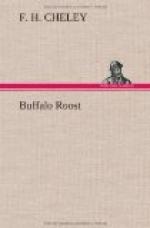“If it had been summer, and the snow and ice gone, we would probably have noticed that there was a terrible storm gathering in the valley back of Cameron’s Cone; but with the range all white and dreary we did not notice it. You fellows who have lived here near the mountain know that a storm often rises up there as if by magic. They come so quickly you often wonder where they came from. Of course, being directly in the shadow of Pike’s Peak, the sun went down very early, and our twilight was not as long as we anticipated. I was the first to notice the cold breeze that had sprung up, and I remarked about it; but we were walking fast and were really too much interested in reaching the edge of the snow to pay much attention to anything. Suddenly it grew dark and the wind increased. In less than ten minutes we were in the midst of a howling mountain blizzard and the snow was being driven before the wind at a terrific speed. John suggested turning back, but Al and I were for pushing on, thinking it was just a squall, and, as it seemed to be headed straight down the canyon, we thought we would soon get above it. John insisted that we were crazy, but we made all manner of fun of him, so on we went.
“‘Fools rush in where angels fear to tread,’ sometimes. That is just what we did. We walked on in silence as fast as we could for half an hour. Then we stopped and held a parley. We suddenly awoke from our little dream of foolishness and began to realize that instead of getting out of that storm, we had gotten into it. Up there on that great mountain side we could not see ten feet in any direction. Above us and around us was a raging sea of frozen pellets. The snow was drifting along the track, and in some places it was already completely hidden. Night was coming, and there was no shelter from the swirling winds. In number of miles we were a good deal nearer the summit of the Peak than we were home, and somewhere ahead of us was the old printing station. We would make for it and its shelter—it would be foolish to expose ourselves to the storm by returning in the open valley. Then, too, we might lose our way and slip into the canyon below. We fought on bravely in the dark until finally the wind went down a little and the snow grew soft and wet. Our shoes were wet through and our bodies completely chilled, yet we could not find the printing station. Had we passed it, or was it still ahead. We differed in our opinions.
“Finally the snow ceased, and we could see about us a little by the reflected light. We spied a few straggly trees and made for them, for we were just at timber line. We found a great tree that had blown over, and, breaking limbs from its prostrate trunk, we built a large fire and sat on the log to dry our feet. We were now very keenly alive to our situation, and knew it was becoming serious. We suddenly realized that our only safety depended on the locating of that old printing station. Our shoes were so wet and our feet so cold that the leather burned before we knew it; but, as a real matter of fact, we didn’t realize how badly they were burned until an hour later, when the shoes began to crack away in bits and the uppers to rip open along the seams.




